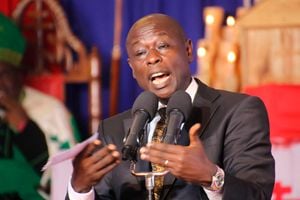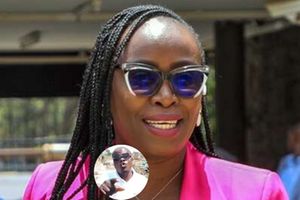Goodbye Nairobi... Sonko Rescue Team relocates to Mombasa

Water bowsers belonging to Sonko Rescue Team drive past the dais during the Labour Day Celebrations at Uhuru Park in Nairobi on May 1, 2017. PHOTO | SALATON NJAU | NATION MEDIA GROUP
Sometime in 2015, the Sonko Rescue Team (SRT) was formed, attracting controversy and admiration in equal measure.
Whether it was paying for women’s maternal health care, footing the cost of weddings or burials or funding youth projects, the group mostly made of unemployed youth helped the then-controversial Nairobi Senator Mike Sonko forge a deep sense of solidarity with those who voted for him.
In his own admission in previous interviews, the lobby would provide for citizens who had been failed by county services under the leadership of then Nairobi governor Evans Kidero.
The team also offered ambulances, fire engines and garbage trucks to city dwellers.
Bad move.
Mr Kidero would argue that its operations undermined his administration and at times, usurped the county government roles.
At some point, the county emergency services and the SRT would try to beat each other to the scene of a fire, accident or even illegal demolitions.
At stake was credit for who had responded to the plight of the victims first.
And as much as these were genuine rescue missions, they were also political campaigns in the battle for the political soul of the Nairobi capital.
Eventually, Mr Sonko would go ahead to beat Mr Kidero in the 2017 Nairobi governor election with the lobby’s activities backing up his claim to be the man of action.
And now Sonko, a popular vote mobiliser with cross-ethnic appeal has shifted the group’s activities to Mombasa county where he is vying for governor on a Wiper Party ticket.
While critics insist it is a populist tactic since he will be vying for the county boss position, Sonko says the relocation is due to “public demand”.
The group recently catered for the funeral expenses of a Mombasa based mechanic whose body was transported to his Kitui home.
“There are those who demean the work we do. But the entry of the Sonko rescue team into the county of Mombasa signifies yet another chance to extend the helping hand to the people of the coastal city and the entire region as well,” Mr Sonko said.
“If your house floods are hungry we will be there. SRT will have Mombasa youth as its employees. We have 20 ambulances on standby starting today and we will not wait for us to get into government. For our Muslim brothers as we will be there for you in case of any humanitarian challenges,” he stated.
The politician, should he be cleared by the IEBC to run, said he was keen on the inclusion of unemployed youth in Mombasa into the initiative.
He added crime rates are high because of gangs responsible for robberies and muggings in specifically marked territories in Mombasa and the potent force they have become, especially among the political class.
Mr Sonko said members of the gangs are armed with crude weapons, including pangas, metal rods, machetes and swords.
“But we round them up as we did in Nairobi to undergo rehabilitation so that they become useful people in our county. This is an initiative we will undertake in every sub-county in Mombasa,” he said.
The newly unveiled team will collect and sell garbage to the county which under Sonko’s administration will recycle it.
The rescue team head Mohammed Jawe said although the group will shift to Mombasa, it will still be active in Nairobi where it was initially based.
“We have a 600-member group. We are not a political outfit but a lobby out to help the less vulnerable members of the society,” he explained.
Two years ago, a report, dubbed “Politics of crime; Kenya’s gang phenomenon” by the Global Initiative-Against Transnational Organised Crime (GI-TOC) cast doubts on the real motive of the SRT.
It noted that SRT’s influence has grown widely and is used to silence Sonko’s critics to the extent of invoking violence.
The group recommended increased monitoring of politicians' use of gangs in the lead-up to the 2022 General Election.
It further calls for a reduction in police use of force and brutality in silencing gangs in favour of political and developmental solutions to the problem.
The survey focused on Nairobi and Mombasa counties where criminal gangs camouflage as basic utility service providers helping communities sort out water, electricity and waste problems as others take to demanding illegal taxes from matatu crews.
Interviews for the survey consisted of law enforcement officers, current and former gang members, informers, journalists, civil society organisations and politicians involved with the groups.





